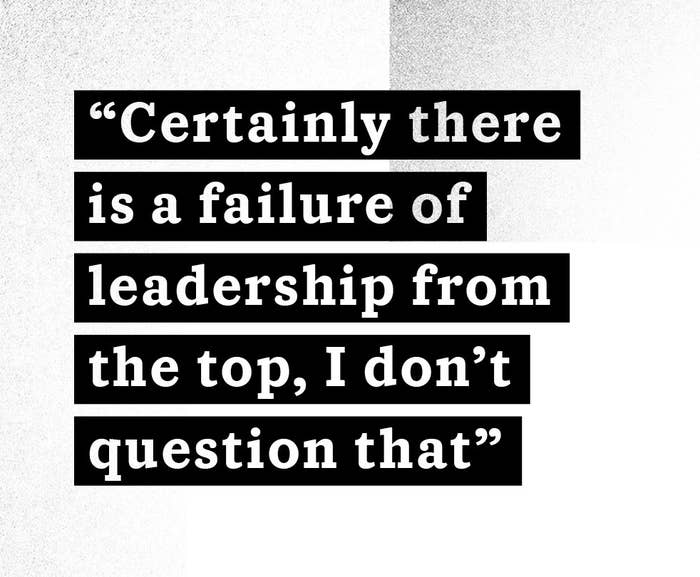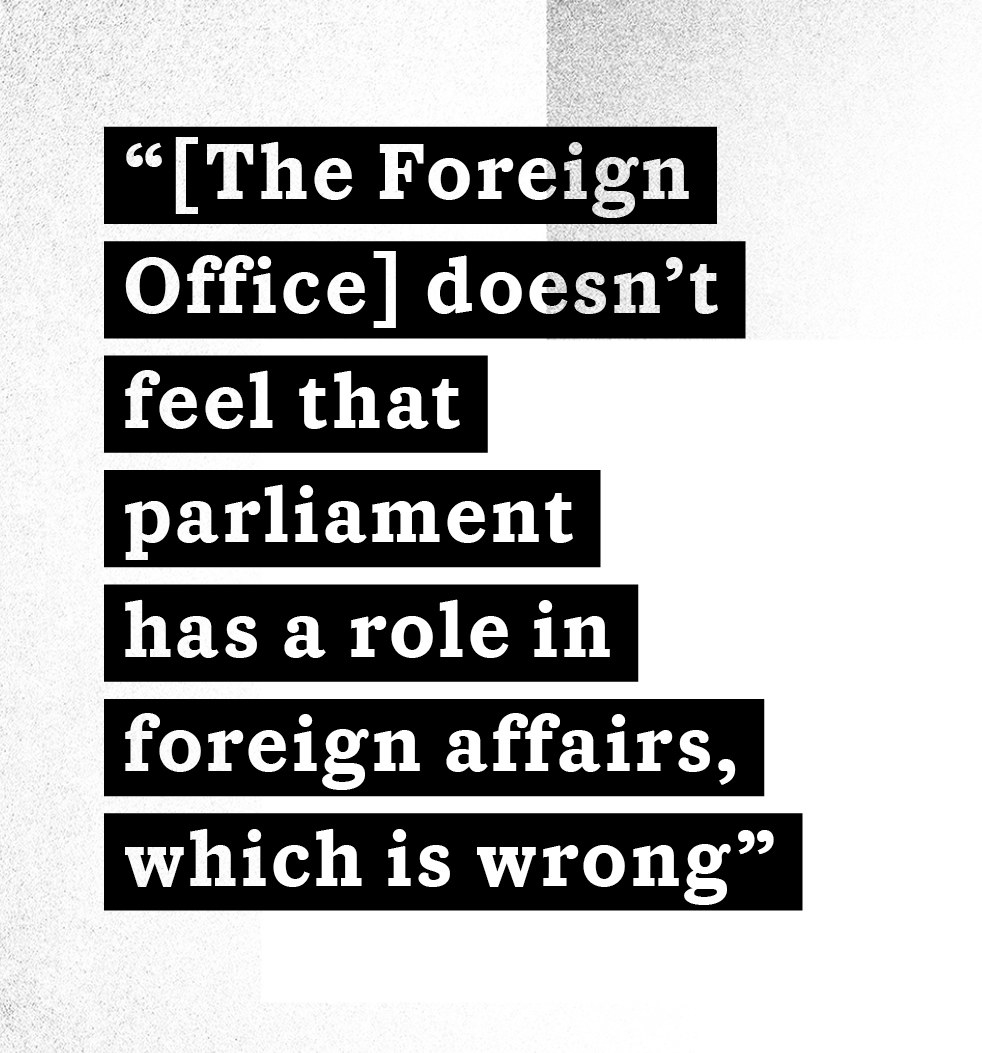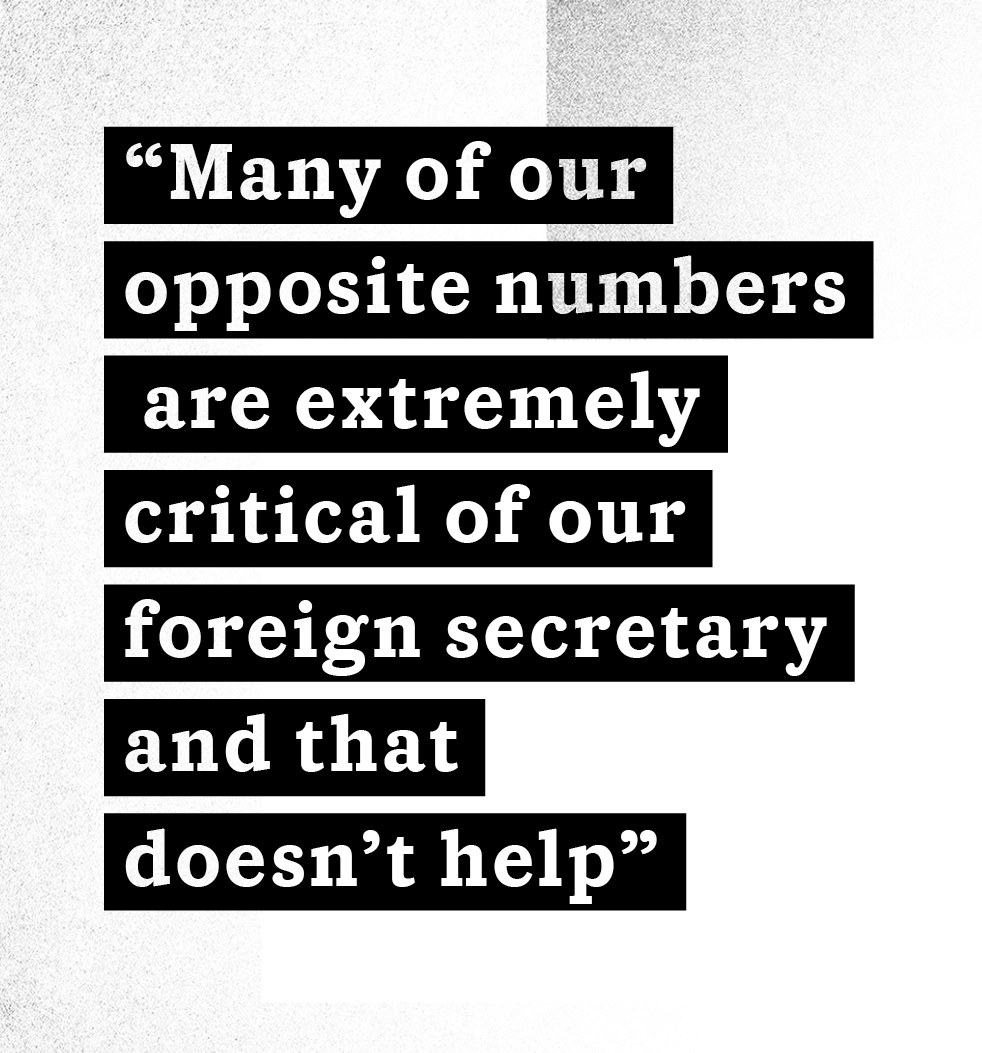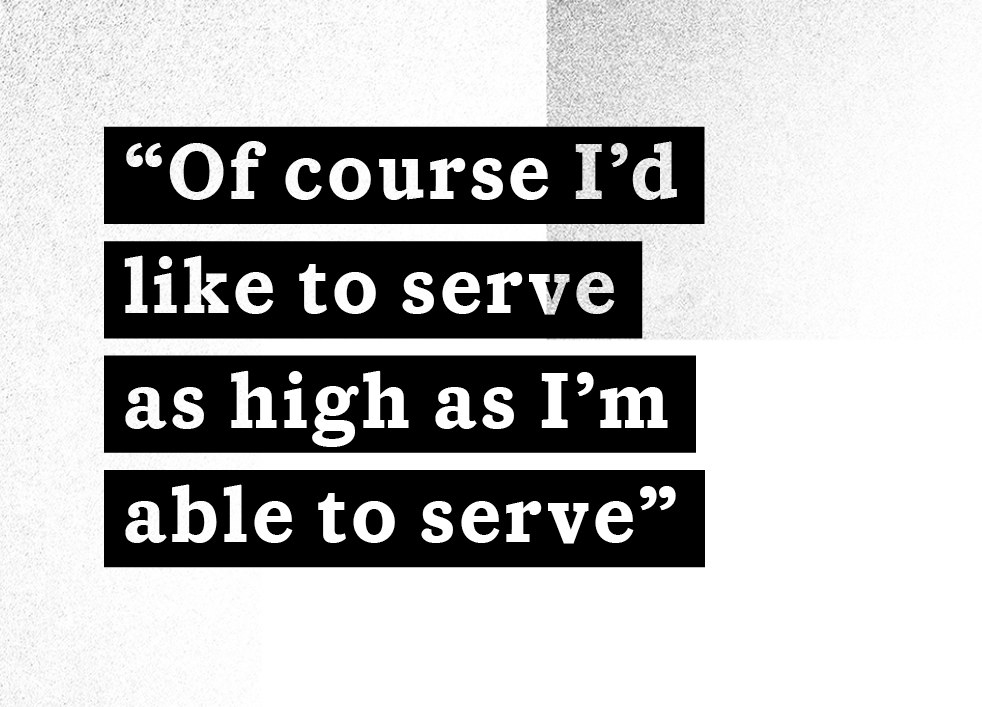Tom Tugendhat, the chair of the foreign affairs select committee, is picking his words carefully. “Look,” he says. “You know I’ve been critical of the foreign secretary in the past and I’m going to continue to be where I see the need to be.”
BuzzFeed News is speaking to the Conservative MP, long tipped by colleagues as a future party leader, in a grand committee room deep in the Westminster estate.

The former army officer was elected chair last July, just two years after becoming an MP, and has so far made it abundantly clear he has no time for any attempts by Boris Johnson to duck scrutiny.
Does he think Johnson is an effective foreign secretary? “One of the things I notice is that the Foreign Office seems to have somewhat lost its way – and certainly there is a failure of leadership from the top, I don’t question that – but there’s also a cultural issue,” he says.
“This is an organisation that at one point conducted British overseas strategy for however many hundred countries … but now it doesn’t do Europe, it doesn’t do trade, it doesn’t do aid.
“If one runs through the things that the Foreign Office now no longer does, one wonders why it can’t focus its efforts on the areas it still does.”
It is one of a number of quietly stinging remarks Tugendhat makes throughout the interview. In measured language, the 44-year-old goes on to call into question the way the government has conducted Brexit, demands the Foreign Office do more on Syria, and says Britain has failed to stand up to Iran.
His committee is expected to publish a report shortly, criticising the Foreign Office for the UK losing its seat on the International Court of Justice, the UN’s most powerful court, for the first time since it was set up in 1946.
Tugendhat says this is a failure of multinational diplomacy that is “very serious” and a “real blow to the Foreign Office”.
In another swipe at Johnson, he says: “The culture of all organisations starts at the top. When I was a soldier – and I’ve noticed the same thing now as a member of Parliament – when you visit a unit, whether it’s a ship, air base, barracks, school, hospital, you can often tell very quickly whether it’s well run. And that comes from the top.”

Tugendhat’s interactions with Johnson have dripped with mutual distrust ever since he took the chairmanship. They repeatedly clashed at a committee hearing in November – when Johnson hit back over Tugendhat’s suggestion that humour does not translate internationally – and have exchanged some testy letters over the Foreign Office’s apparent failure to provide sufficient documents for an inquiry.

Does Tugendhat believe that Johnson takes the foreign affairs committee seriously? “I think there’s a cultural issue with the Foreign Office that it doesn’t feel that parliament has a role in foreign affairs, which is wrong,” he says.
“The truth is that the Foreign Office and embassies represent the people of Great Britain … And the people are represented, legally in our country, by their representatives in parliament. And therefore the relationship between the Foreign Office and parliament should be hand in glove.
“Of course we have a role in checking their budget ... but we also have a role in overseeing foreign policy and there is often a feeling that our role should be more distant. And that’s wrong, that’s simply wrong. And I will be using the term I have to ensure we continue to press the Foreign Office for answers and hold it to account.”

Tugendhat was in the Territorial Army for over 10 years, serving on operations in Iraq and Afghanistan and rising to become military assistant and adviser to General David Richards, then chief of the defence staff.
He was elected MP for the safe Tory seat of Tonbridge and Malling, Kent, in 2015. “The reason I ran in the first place is you get to a point in the army where you can’t change the orders and you need to change the strategic direction and the best place to do that is here in this building,” he tells us.
“So having this opportunity to have my voice heard on foreign affairs is hugely important to me.”
He was a firm Remainer in the run-up to the EU referendum; he says he was disappointed by the result but it was a legitimate vote and the people have spoken.
Asked for his assessment of the Brexit negotiations so far, he replies: “I've been pretty clear from the beginning I wouldn’t conduct them quite like this, but we are where we are.
“The truth of it is we have had a relationship with continental Europe for 8,000 years and we’re going to have a relationship for the next 8,000 in some way or another.
“We’ve got to make sure that that relationship looks more like the last 70 years than any of the previous 70 years before that, which were marked with conflict, competition, and in many ways terror and violence, and that means we’ve got to remember everyone here has an interest – all 28 countries have a different interest.
“Other countries aren’t trying to punish and reward, they’re merely standing up for their interests, and using terms like ‘punishment' is really unhelpful because it’s not true actually.”
He warns, however, that the process will be expensive because the Foreign Office will have to “employ more diplomats and bureaucrats of our own to manage the relationship at various different levels”.

“We’re going to have to spend more on representation abroad because we want to get our voice heard – whereas before we could get our voice heard in Brussels and that would multiply around the continent,” he says.
“Many of our opposite numbers are extremely critical of our foreign secretary and that doesn’t help, but he is representing a view that was voted for, so our European partners, I’m afraid, have got to get over that.”
And he is convinced that divisions within the Tory party over Brexit can be healed. “The prime minister's done remarkably well on this. By playing it long she is helping to bridge the divide,” he says.
“If you look at where we’ve come to, the day after the referendum, the feeling was very strong that there should be no transition. We’ve now agreed the transition, which will cost something, and you’ve got Iain Duncan Smith accepting that. That’s something – she has bridged the divide.”

Britain has a responsibility towards the world’s most vulnerable people because it is a permanent member of the UN security council and one of the biggest military powers in the world, Tugendhat says.
He points to a paper he wrote with Labour MP Jo Cox, the former aid worker murdered in her constituency in June 2016, on the need for Britain to intervene in foreign conflicts to save civilians – despite the consequences of the Iraq war.
And he urges the Foreign Office to put more pressure on Russia to stop the Syrian regime shelling its own people. The rebel-held enclave of Eastern Ghouta, just outside Damascus, has been bombarded for days on end, with hundreds of civilians killed in the last week alone.
“The truth is [Syrian president Bashar al-] Assad is a puppet of the Iranian and Russian regimes and the moment they’ve got bored of him he'll be either in exile or swinging from a lamppost,” Tugendhat says.
“They will decide how long he stays there, nobody else, and currently the Russians are quite happy to support one of the most murderous dictators in the Middle East … We have a role in putting pressure on Russia to stop this regime.”
He also says Britain has failed to stand up to Iran, despite the country taking British hostages, developing missiles, and destabilising the Middle East.
“I am very critical that we have not properly set up a policy designed to stand up to Iran,” he says. “Now, that does not mean standing blindly with anyone who opposes Iran but we should recognise that Iran’s actions in the region are poisonous.
“The tragedy is that Iran is one of the greatest countries in the world. It has a history of art and culture deeper and richer than anywhere else.
“It’s absolutely heartbreaking to see this extraordinary country run by a violent mob of gangsters.”
He declines to comment on Johnson’s handling of the case of Nazanin Zaghari-Ratcliffe, the British-Iranian mother detained in Iran almost two years ago on spying charges. Johnson was widely criticised for incorrectly telling the foreign affairs committee she was training journalists at the time of her arrest, a claim he later retracted.

Tugendhat made headlines last year when he said frankly that “it would be great to be PM” – some rare candour for an up-and-coming MP. He tells us he doesn’t find it hard to say what he really thinks.
“The purpose of doing politics is to try and influence change in your country,” he says. “I’m a Conservative, I’m not a radical, so it’s not a revolution – but it’s to make a difference, which is why I ran for chairmanship of this committee and why of course I’d like to serve as high as I’m able to serve.

“But you can make an awful lot of change in this place in a lot of different ways. Funnily enough I’m rather of the feeling that you have more influence as a backbench MP than you do as junior minister.”
He recently live-tweeted his attempts to look after his two young children while his wife, French supreme court judge Anissia Morel, was away. He jokes that it's “much harder” than chairing the committee.
“The energy of a 4-year-old boy and a 1-year-old girl is just … every now and then you’ll turn around and the other one’s hitting the other one with a hammer for no apparent reason. They’re not even fighting, it’s just everyday brutality of the playground,” he says.
His family is more important than his political career, he says. “I think when all this is over, there’s only a few people I’ll walk out of here with – my wife and children are it. This is a passing phase.”
